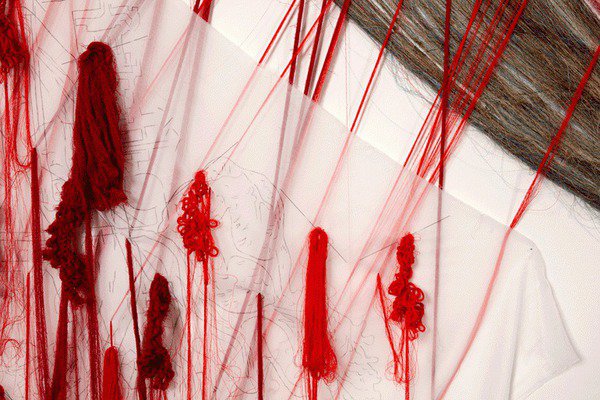Aiko Tezuka
dal 7/11/2013 al 20/12/2013
Segnalato da
7/11/2013
Aiko Tezuka
Galerie Michael Janssen, Berlin
Rewoven. Japanese artist unravels threads or extracts certain coloured threads from the fabric, so that the designs or the woven motifs fade out into a blurred image of what they originally depicted.

Galerie Michael Janssen Berlin is proud to present its first solo show with Japanese
artist Aiko Tezuka. 2013 her works were shown in the Künstlerhaus Bethanien in
Berlin in an exhibition entitled Ghost - Suspended Organs.
"Aiko's work does not deal with diagrams; her practice is based in fabrics. Fabrics
are usually directed towards an end-product such as clothes or furnishings.
Therefore they function to add up to something else. A fabric rarely refers to
itself simply as a fabric; moreover it usually refers to something more complex, so
it is an element which is used for something.
Aiko, however, has a reverse view of fabrics. She takes the fabric and dissects it
according to its own principles - the threads. Like a cartographer, she shows the
inner structures of things. The chosen fabric can be considered a readymade, which
she does not take to be a static entity, but rather attends to it to visualise and
dissect it into constituent parts.
The different types of fabric that she uses are not diligently manufactured or the
outcome of certain precise processes. Mostly, they are fabrics that are either
objects of utility or simple mainstream souvenirs, such as the Gobelinesque views of
Canale Grande in Venice and fabrics that one in Germany would deridingly name:
'Gelsenkirchener Barock'.
Aiko unravels threads or extracts certain coloured threads from the fabric, so that
the designs or the woven motifs fade out into a blurred image of what they
originally depicted. The outcome of the unravelling process shows something that is
usually invisible, since the threads only gain in importance once they come
together, to constitute fabric with its different motifs or images.
By unravelling the thread by hand, Aiko applies an arduous and painstaking method
that is far from the actual process of the industrial production from which the
fabric originated. The discrepancy between Aiko's work with her hands, and the
machine-produced fabric is taken one step further: in some of her works she
reconnects the threads again by re-using them for her own stitching. This is a very
poetic transformation in a way, to re-engage material, which evolved originally from
an industrial work and to make a new piece of work from it.
[...] By re-using fabrics, Aiko engages with the meaning of fabric itself, its
cultural heritage, its designs, the origin of motifs and the globalised market of
industrial productions.
Over time, intercultural transfer has led to the exchange of motifs, so that no
design pattern of fabric is original in terms of a country of origin. This is even
more pronounced in times when Western culture seems to be viewed as being
state-of-the-art. Therefore the fabric that Aiko uses could be seen to symbolise the
constituent parts of where a traditional motif or a design comes from and the act of
unravelling those bonds as an attempt to show the compositions that our cultures
consist of in its fragments.
Returning to the maps and schemes, one cannot deny that the underside of an
embroidery appears very much like a map or a scheme. Similarly, making invisible
structures visible are functions that these types of plans also have. While the
deconstruction of its intended appearance is in one way a careless or destructive
act, the thoughtful unravelling and re-enaging of the threads in Aiko's work could
not be more mindful."
Christina Lehnert, Assistant Curator, Kunsthalle Bielefeld, excerpt from "The inner
scheme of fabric"
"Through retroaction, the rediscovered white threads reveal the hidden structure of
the fabric in a method similar to that employed in some of the works by Giuseppe
Penone. This gives the piece a new image as if it were a living organism that is
continuously transforming itself.
It also exudes an atmospheric gloom where we may sense something like a human
figure. Perhaps this can be likened to a physical collapse of a painting" [...]
Chief Curator, Toyota Municipal Museum of Art, Aichi, Japan
The texts were published in the catalogue "Rewoven-Overflow" at occasion of the
exhibition "Ghost - Suspended Organs" at Künstlerhaus Bethanien, January 17 -
February 10, 2013, Berlin
Aiko Tezuka: b. 1976 in Tokyo, Japan. Lives and works in Tokyo.
Solo Exhibitions (selection): 2013: Künstlerhaus Bethanien, Berlin. 2011: Beer
Oyamazaki Villa Museum, Kyoto, Japan. KENJI TAKI Gallery, Nagoya and Tokyo, Japan;
Group Exhibitions (selection): 2012: Atelierhof Kreuzberg, Berlin, Germany. @KCUA
gallery, Kyoto Art University of Arts, Kyoto, Japan. 2010: Royal College of Art,
Sculpture, London, UK. Bunkamura The Museum, Tokyo, Japan. 2009: Seoul Museum of
Art, Seoul, South Korea.
For further information please contact: Fabio Pink, f.pink@galeriemichaeljanssen.de
Tel: +49 30 259 272 50, Fax: +49 30 259 272 518
Opening Friday, November 8, 6 - 9 p.m.
Galerie Michael Janssen
Potsdamer Str. 63 - D-10785 Berlin
Tue - Sat 11 am - 6 pm



